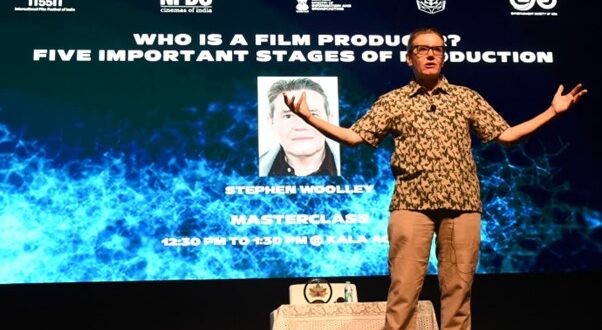Noted English Filmmaker and Actor, Stephen Woolley today addressed an enlightening masterclass on “Who is a Film Producer? – Five Important Stages of Film Production” at the 55th International Film Festival of India (IFFI), Goa.
Goa:26/11/24:The session, attended by aspiring filmmakers, students, and film enthusiasts, offered an in-depth exploration into the multifaceted role of a film producer, breaking down the filmmaking process into five essential stages: Development, Pre-Production, Production, Post-Production, and Marketing & Release.
Stephen kicked off the masterclass by emphasizing that the journey of a producer starts with a deep passion for a concept or story. “A producer must first feel that rigor and passion for the project,” he explained, stressing that producers need to ask themselves, “Is this something that will be my life?” In his view, while passion and commitment are crucial, a producer must also be pragmatic, finding a balance between vision and practical constraints.
In his discussion of the pre-production phase, Stephen highlighted the significance of collaboration. “Producers are primarily collaborators,” he asserted, underscoring the importance of working closely with financiers, creative professionals, and other key stakeholders to bring a project to fruition.
The production phase, Stephen explained, requires careful planning and execution, while also maintaining a delicate balance between the producer and director. “A producer must keep their ego under control all the time and provide creative space to the Director”, he remarked. This collaborative approach extends to the entire cast and crew, with the producer’s role being one of facilitation rather than domination.
Stephen further elaborated on the excitement and importance of the post-production phase, where the final touches are applied to the film before it reaches the audience. He highlighted the significance of test screenings on a small scale, which offer valuable insights into the audience’s response and provide an opportunity for refinement. “Audience are the people, who decide the fate of a film. If the audience likes your film, your work is done,” he noted.
The final phase, Marketing and Release, requires strategic planning. Stephen emphasized the necessity of a strong marketing strategy involving advertisers, distributors, and other partners to successfully bring the film to market.
Through his insights, the acclaimed filmmaker not only shed light on the complexities of filmmaking but also offered invaluable guidance to the next generation of filmmakers, reinforcing the importance of passion, pragmatism, and collaboration in the art of producing.
About the Speaker
Stephen Woolley is an English Film producer and actor whose career has spanned over three and a half decades, during which he was awarded the BAFTA award for Outstanding British Contribution to Cinema in February 2019; as a producer, he has been Oscar-nominated for The Crying Game (1992) and has produced multi-Academy Award nominated films including Mona Lisa (1986), Little Voice (1998), Michael Collins (1996), The End of the Affair (1999), Interview with the Vampire (1994), and Carol (2016), and he runs the production company Number 9 Films with his partner Elizabeth Karlsen.
 Odisha news today, Latest Oriya News Bhubaneswar Online Odia news Portal
Odisha news today, Latest Oriya News Bhubaneswar Online Odia news Portal




